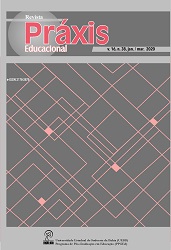LA EDUCACIÓN EN AZERBAIYÁN COMO OBJETO DE ESTUDIO EN LITERATURA
DOI:
https://doi.org/10.22481/praxisedu.v16i38.6011Palabras clave:
Educación, Azerbaiyán, Colegio, LiteraturaResumen
En el siglo XIX, los azerbaiyanos en todo el Cáucaso vivían más densamente en el oeste de Azerbaiyán. La originalidad material y los valores morales, la literatura folclórica, el arte del ashik (un cantante de canciones tradicionales), una red de escuelas masivas, monumentos de arte, arquitectura diferente. Al mismo tiempo, los azerbaiyanos que viven en el oeste de Azerbaiyán fueron un ejemplo de preservación y enriquecimiento de nuestro lenguaje literario, nuestra religión, nuestras costumbres y tradiciones, matrimonios mononational. En el siglo XIX en Azerbaiyán, en su parte occidental, se desarrollaron los negocios escolares y la educación. Con la apertura de escuelas para los asentamientos en hileras del país, junto con el idioma nacional, el estudio del ruso tampoco quedó sin abordar.
Descargas
Métricas
Citas
Akhmedov T., (1971) The drama of Nariman Narimanov, Baku, Science, (pp.272)
Ashish Joshi, Jane Meza, Sergio Costa, Douglas Marcel Puricelli Perin. The Role of Information and Communication Technology in Community Outreach, Academic and Research Collaboration, and Education and Support Services (IT-CARES) // Perspect Health Inf Manag. 2013 // https://www.ncbi.nlm.nih.gov/pmc/articles/PMC3797554
Ayyar, R.V.V. (1996). Educational policy planning and globalisation. International Journal of Educational Development, 16(4), 347-354.
Contemporary Azerbaijan in Social and Political Dimension (2016). Edited by Piotr Bajor. Kraków. - 126 p.
George T., (2003) Abed and Hamid R. Davoodi Challenges of Growth and Globalization in the Middle East and North Africa. International Monetary Fund 2003 // https://www.imf.org/external/pubs/ft/med/2003/eng/abed.htm
Green, A. (1999). Education and globalization in Europe and East Asia: onvergent and divergent trends. Journal of Education Policy, 14(1), 55-71.
Habibbeyli I., (1994) March, 4, № 10 the idea of in the school of Head Norashen // Literary newspaper.
Habibbeyli I., (2003) the master word of Mirza Celil Mammedquluzade //Mammedquluzade 7. Work Tom 1, Baku, Chinar, (pp. 464)
Hacıyev A., (1980) the climate of the literary of Tiflis, Baku, Yazichi, (pp.183)
Isaxanli H., (2014) History and Policy of Translating Poetry: Azerbaijan and Its Neighbors // Érudit Journals Meta, Volume 59, Number 2, August 2014, pp. 233-466
Ismayilova K., (1900) Selo Nehram //SMOMPK, Tiflis, №027 (pp.196)
Mammadli A., Allahyarova N., (2002), Mea Culpa The acknowledgement of Armenian elite Baku.
Mammadov I., (2008) Erevan copy book. Boring horizons in the history of the social thought, Baku, Abiloghli, (pp.216)
Mamedli P.H., (2015) Literature in Southern Azerbaijan. May - June 2015 // http://www.visions.az/en/news/655/8631a8e0/
Maud MTE Huynen, Pim Martens and Henk BM Hilderink (2005). The health impacts of globalisation: a conceptual framework Global Health. 2005; 1: 14. // https://www.ncbi.nlm.nih.gov/pmc/articles/PMC1208931
Seyid-zade D., (2010) Azerbaijan in the Beginning of XX century: Roads Leading to Independence. Baku 2010 OKA. 344 pp
The torch in the city of ignorance, (2006), Baku, Gismet, (pp.360)
The calendar of Caucasus Tbilisi (1886, 1899, 1900, 1901, 1903, 1907, 1908).
Vedibasar, (2008), April, 01-15, № 07 (pp.122),
Descargas
Publicado
Cómo citar
Número
Sección
Licencia
Usted es libre de:
Compartir — copiar y redistribuir el material en cualquier medio o formato; Adaptar — remezclar, transformar y construir a partir del material para cualquier propósito, incluso comercialmente. Esta licencia es aceptable para Obras Culturales Libres. La licenciante no puede revocar estas libertades en tanto usted siga los términos de la licencia.
Bajo los siguientes términos:
Atribución — Usted debe dar crédito de manera adecuada, brindar un enlace a la licencia, e indicar si se han realizado cambios. Puede hacerlo en cualquier forma razonable, pero no de forma tal que sugiera que usted o su uso tienen el apoyo de la licenciante.
No hay restricciones adicionales — No puede aplicar términos legales ni medidas tecnológicas que restrinjan legalmente a otras a hacer cualquier uso permitido por la licencia.










